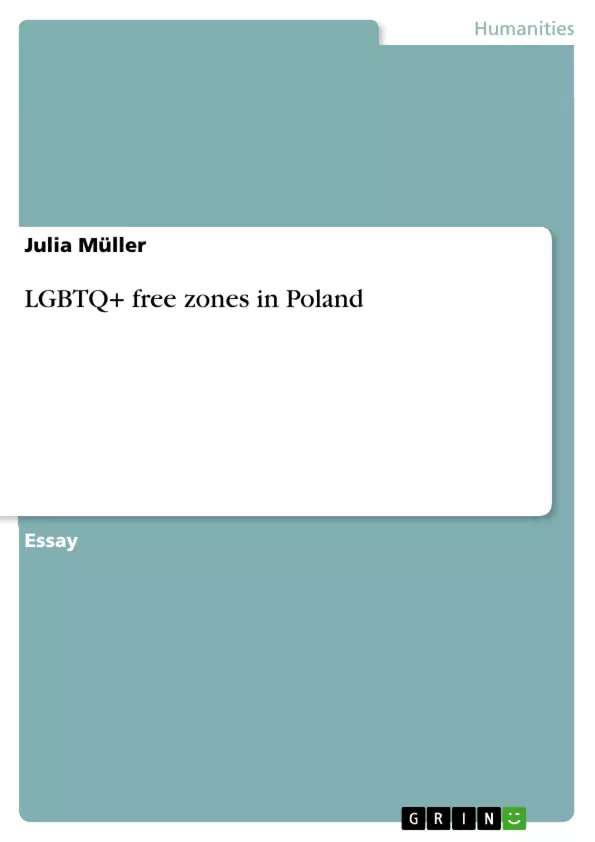This essay examines LGBTQ+ free zones in Poland. Looking at the political landscape the conservative right-wing party “Prawo i Sprawiedliwość” (PiS) has undergone a political upswing since their founding in 2001 and has recently been in government from 2015 on. The party drives a very strict anti-LGBTQ+ rhetoric and policy agenda, especially Andrzej Duda made it a central issue for his election campaign in July 2020.
Although the Polish constitution implies a division between church and state, the Catholic church has a big influence in the political decision-making process. The LGBTQ+ community in Poland has “long struggled with acceptance, but it is only recently that people have become bolder in showing their reluctance” and express homophobia and transphobia even more openly.
As can be seen by the attacks on participants at Pride marches in Bialystok, Lublin, Wroclaw and several others. Discrimination based on sexual orientation is illegal in Poland but so are same-sex marriage and civil unions. In 2019, multiple Polish provinces have declared themselves a “LGBTQ+ free zone”, meaning they are distancing themselves from the alleged “LGBTQ+ ideology” and show that they are refraining from broad tolerance which consequently makes the approval of LGBTQ+ events like pride marches improbable.
Inhaltsverzeichnis (Table of Contents)
- Introduction
- Overall LGBTQ+ Situation in Poland
- What are the so-called “LGBTQ+ free zones”?
- Juridical and political Impact
- Starting point
- Ideology behind it
- EU sanctions
Zielsetzung und Themenschwerpunkte (Objectives and Key Themes)
This essay examines the emergence of “LGBTQ+ free zones” in Poland, exploring the political, social, and legal context surrounding their declaration. It analyzes the motivations behind this movement, the implications for the LGBTQ+ community, and the international response, particularly from the European Union.
- The rise of conservative politics and the influence of the Catholic Church in Poland
- The growing visibility and acceptance of the LGBTQ+ community, coupled with increasing homophobia and transphobia
- The political mobilization of LGBTQ+ issues by the ruling PiS party and its impact on the 2020 presidential election
- The legal status and effectiveness of “LGBTQ+ free zones” and their implications for the rights and freedoms of LGBTQ+ individuals
- The role of the European Union in responding to the situation and its efforts to uphold non-discrimination and equality in member states
Zusammenfassung der Kapitel (Chapter Summaries)
- Introduction: This section sets the stage by outlining the political landscape in Poland, highlighting the influence of the Catholic Church and the rise of the conservative PiS party. It introduces the concept of “LGBTQ+ free zones” and their connection to the party's political strategy.
- Overall LGBTQ Situation in Poland: This chapter provides an overview of the historical and contemporary challenges faced by the LGBTQ+ community in Poland, including discrimination, legal limitations, and the prevalence of homophobia and transphobia.
- What are the so-called “LGBTQ+ free zones”?: This chapter defines the concept of “LGBTQ+ free zones” as they have emerged in Poland. It explains how these zones, despite lacking legal power, represent a deliberate attempt to marginalize and exclude the LGBTQ+ community.
- Juridical and political Impact: This section examines the legal and political ramifications of “LGBTQ+ free zones.” It highlights the discriminatory nature of these declarations and their use as a tool for advancing populist agendas.
- Starting point: This chapter explores the origins of the “LGBTQ+ free zone” movement, focusing on the role of Mayor Rafał Trzaskowski’s “LGBT+ Declaration” and the backlash from the PiS party and the Catholic Church.
- Ideology behind it: This chapter delves into the ideology driving the PiS party’s anti-LGBTQ+ rhetoric and policies. It analyzes the party’s attempts to portray LGBTQ+ rights as a threat to traditional Polish values and the use of fearmongering to mobilize voters.
- EU sanctions: This chapter examines the European Union’s response to the situation, highlighting its condemnation of discrimination against the LGBTQ+ community in Poland and its use of financial sanctions as a means of upholding EU values.
Schlüsselwörter (Keywords)
This essay focuses on the themes of LGBTQ+ rights, homophobia, transphobia, political mobilization, populism, discrimination, legal challenges, European Union, sanctions, and the role of the Catholic Church in shaping public opinion and influencing political discourse in Poland.
Frequently Asked Questions
What are "LGBTQ+ free zones" in Poland?
These are provinces or municipalities in Poland that have declared themselves free from "LGBTQ+ ideology," distancing themselves from tolerance and LGBTQ+ events like pride marches.
What is the role of the PiS party in this context?
The ruling party "Prawo i Sprawiedliwość" (PiS) has used strict anti-LGBTQ+ rhetoric as a central political tool, especially during election campaigns, to mobilize conservative voters.
How does the Catholic Church influence Polish politics?
Despite the constitutional division of church and state, the Catholic Church holds significant influence over political decision-making and public opinion in Poland.
Are these "free zones" legally binding?
While they mostly lack direct legal power to ban individuals, they serve as a tool for marginalization and exclusion, making the approval of LGBTQ+ events highly improbable.
What are the consequences from the European Union?
The EU has condemned these zones as discriminatory and has implemented financial sanctions against regions that maintain such declarations to uphold EU values of equality.
- Citation du texte
- Julia Müller (Auteur), 2020, LGBTQ+ free zones in Poland, Munich, GRIN Verlag, https://www.grin.com/document/1214629



